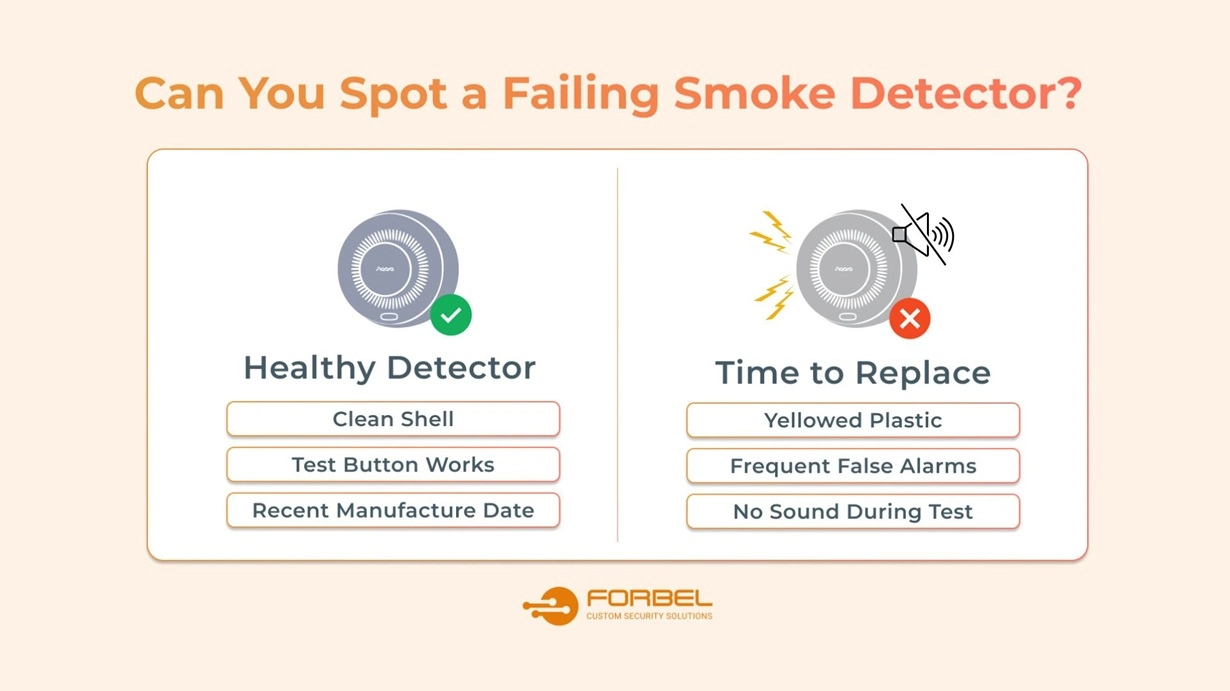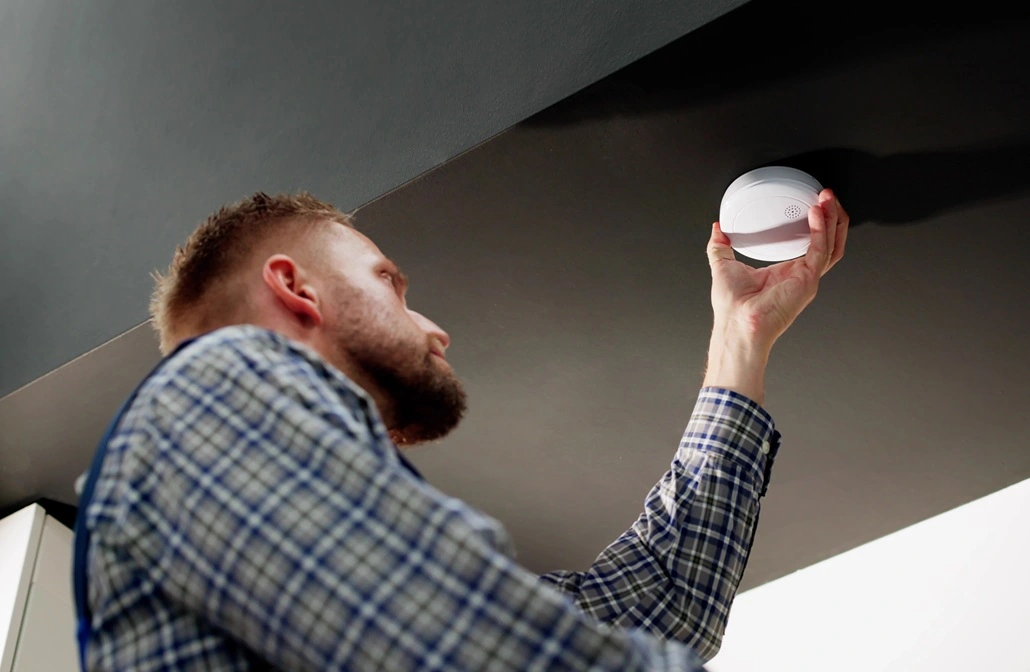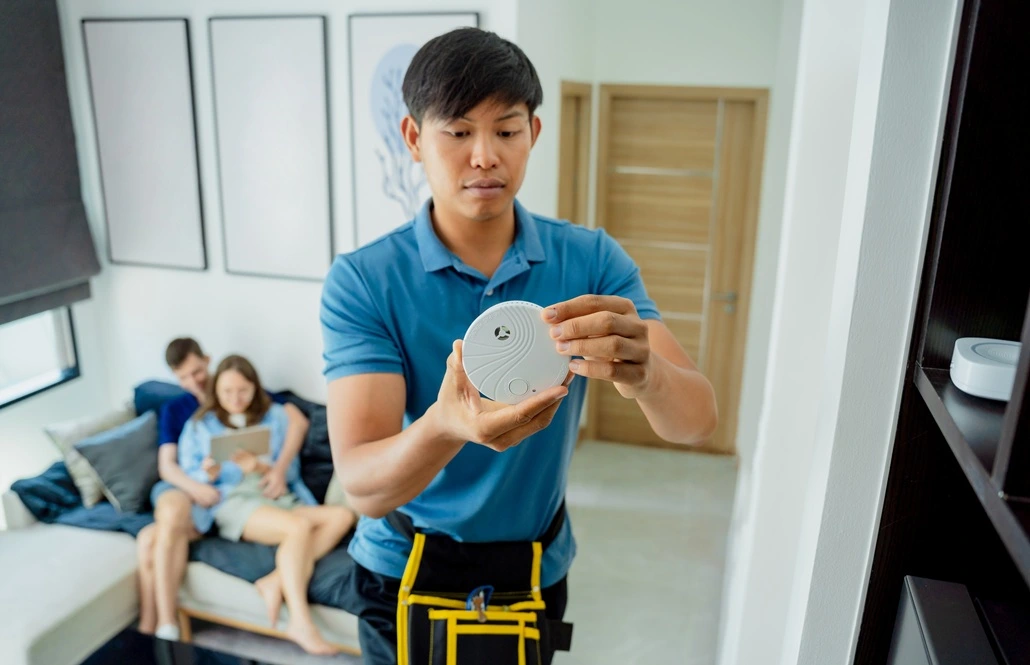
How Long Do Smoke Detectors Last? Your 2025 Safety Guide.
Discover the lifespan of smoke detectors and when to replace them for optimal safety. Learn vital tips in our guide.

Smoke detectors are critical safety tools that serve as the first line of defense in the event of a fire, offering a crucial early warning that can save lives and protect property. Despite how important they are, these devices aren't infallible; they require regular maintenance and eventual replacement to function effectively.
Understanding the maintenance needs and lifespan of your smoke detectors is vital for ensuring they operate optimally when you need them most. According to the National Fire Protection Association (NFPA), smoke detectors should be replaced every 10 years from their manufacture date, not from their installation date. Our experts at Forbel have put together this guide to provide essential tips for maintaining your smoke detectors, helping you to safeguard your apartments or commercial space against the threat of fire. By staying informed and proactive, you can ensure your environment remains safe and secure.
The Truth About Smoke Detector Lifespans
Your trusty smoke detector plays a crucial role in safeguarding your home and alerting you to potential fire hazards. But like any device, they don't last forever. The lifespan of a smoke detector varies depending on its type, but generally falls within the 8-10 year range according to the National Fire Protection Association (NFPA).
It's a common misconception that if a smoke detector still beeps during testing, it's working fine. However, sensor degradation happens gradually over time; an aging detector may respond to the test button but fail to detect smoke quickly enough in a real emergency. This is why manufacturers like First Alert, Kidde, and industry standards from Underwriters Laboratories (UL) all recommend the 10-year replacement rule.
Here's a breakdown of how long different types of smoke detectors typically last:
If you want to learn more about the different types of fire detectors and which one suits your needs best, check out our comprehensive guide on the different types of fire alarm systems and their detectors.
6 Warning Signs Your Smoke Detector Is Dying Right Now

Every year, nearly two-thirds of home fire deaths occur in homes with no smoke alarms or non-working alarms. Don't become a statistic! Recognizing these warning signs could be the difference between a close call and a tragedy. Your smoke detector is trying to tell you something, and ignoring these signals puts everyone in your building at risk.
Age
The biggest giveaway is simply age. Most smoke alarms, regardless of type, need replacement after 10 years. Check the back for a manufacturing date to track its lifespan.
💡 Remember: the 10-year period starts from the manufacture date printed on the unit, not when you installed it. If a detector was made nine years ago but installed yesterday, it only has one year of service life remaining.
Chirping
An incessant chirping, even after fresh batteries, often indicates an internal malfunction. Don't wait for silence, replace it immediately.
Test Failure
Monthly fire alarm testing is crucial. Use a smoke detector tester or ignite a controlled puff of smoke near the unit (never open flames!). If it remains silent, replace it.
Yellowing
While not a sole indicator, yellowing over time can suggest accumulated dust or smoke exposure, impacting its sensitivity. Play it safe and replace it.
False Alarms
Frequent, unexplained triggers can point to sensor issues. Don't ignore them — replace the alarm before a real fire goes undetected. According to a Consumer Product Safety Commission study on smoke detector operability, over one-third of disabled smoke alarms were disconnected due to nuisance alarms — don't become part of this statistic.
Recalled Models
Check online or contact the manufacturer. If your model is part of a safety recall, replace it instantly. Don't gamble with faulty components.
Remember, a working smoke alarm is your first line of defense against fire. Replace yours promptly when any of these red flags appear, and don't forget to test smoke alarms monthly and replace batteries as recommended. Early detection can save lives!
How to Test Your Smoke Detector
Testing your smoke detector regularly is important to ensure it's functioning properly and is ready to alert you in case of fire. Here's a short step-by-step guide:
- Inform everyone in your home: Let them know you're testing the smoke detectors to avoid unnecessary alarms.
Using the test button:
- Locate the test button: It's usually on the front or side of the detector.
- Press and hold the button: Do this for at least 5 seconds.
- Listen for the alarm: A loud, continuous beeping sound should activate. This confirms that the detector's circuitry, horn, and battery are working.
- Release the button: The alarm should stop immediately.
Alternatively, you can use a smoke detector tester:
- Purchase a smoke detector tester: These can be found at most hardware stores.
- Follow the manufacturer's instructions: They typically involve spraying a small amount of test aerosol toward the detector's sensor opening.
- Observe the alarm: It should sound within 20-30 seconds, indicating proper functionality.
Expert tips:
- If you don't hear the alarm during either test, replace the batteries first. If it still doesn't work, replace the detector.
- Test all smoke detectors in your home, including those in basements and bedrooms.
- Make testing a monthly habit, ideally near the start of a new month.
- Never use open flames to test smoke detectors, as this can be dangerous.

Commercial Smoke Detector Requirements
For commercial buildings, NFPA 72 requires more stringent testing protocols. System smoke detectors (UL 268 listed) need sensitivity testing one year after installation, then every other year. If consistently within range, testing can extend to five-year intervals. Commercial detectors can remain in service beyond 10 years if they pass sensitivity tests, unlike residential units, which must be replaced regardless of test results.
In 2025, fire inspectors are cracking down on non-compliant commercial properties. Beyond basic testing, commercial buildings must maintain detailed records of all inspections, sensitivity tests, and replacements. Failure to comply can result in steep fines, increased insurance premiums, or even forced closure until the violations are corrected. Multi-tenant buildings face additional requirements for interconnected systems that alert all occupants simultaneously.
Are you wondering how many smoke detectors your commercial property needs and where to place them for maximum protection and compliance? Our comprehensive guide on commercial smoke detector requirements breaks down the specific regulations for different building types and helps you avoid costly violations during your next inspection.
Essential Maintenance That Extends Your Detector's Life
Maintaining smoke detectors is crucial for ensuring they function properly and provide timely warnings in case of fire. Here are some essential tips for smoke detector maintenance:
- Test regularly: Test your smoke detectors at least once a month by pressing the test button to ensure they are working.
- Replace batteries: Change the batteries at least once a year, or whenever the low battery signal chirps, to keep the detector powered. Some models come with a 10-year battery, which means you'll replace the entire unit when the battery runs out.
- Clean detectors: Dust and debris can prevent smoke detectors from working efficiently. Use a vacuum cleaner with a brush attachment to gently clean the outside of the detector every six months. Avoid using water or cleaning agents.
- Check installation date: Most smoke detectors have a lifespan of about 10 years. Check the manufacture date on the back of the unit and replace any detector that's 10 years old or older.
- Avoid painting: Never paint over smoke detectors, as paint can clog the sensor chambers and prevent the detector from sensing smoke.
- Replace after activation: If a smoke detector goes off due to an actual fire, consider replacing it to ensure it's fully functional for future incidents.
- Heed false alarms: If a smoke detector frequently gives false alarms, don't just remove the batteries or disconnect it. First, try moving it to a different location. If false alarms continue, replace the unit.
- Keep spares: Keep spare batteries and a backup smoke detector on hand, so you can swiftly address any issues that arise during maintenance checks.
Regular maintenance of smoke detectors is a simple yet effective way to enhance your safety measures against fires, protecting lives and property.

Debunking Common Smoke Detector Myths That Could Cost You Everything
Let's address the dangerous myths that keep people from properly maintaining their smoke detectors. It's time to separate fact from fiction and understand what really keeps your detectors functioning when you need them most:
Myth #1: It Still Beeps When I Test It, So It's Fine
Reality: A working test button only confirms that the electronics work, not that the sensor can detect smoke effectively. Degraded sensors may take too long to detect real smoke, costing you precious escape time.
Myth #2: My Hardwired Detector Doesn't Need Replacement
Reality: Even hardwired detectors have sensors that degrade over 10 years. The power source doesn't affect sensor lifespan.
Myth #3: I'll Just Wait Until It Starts Chirping Constantly
Reality: End-of-life chirping doesn't always happen. Some detectors fail silently, leaving you unprotected without warning.
Myth #4: Expensive Detectors Last Longer
Reality: Whether you paid $10 or $100, all smoke detectors follow the same 10-year rule due to sensor degradation.

Don't Wait Until It's Too Late — Take Action Today
The lifespan and maintenance of smoke detectors are fundamental to ensuring the safety of both residential and commercial spaces. With a general expectancy of 8-10 years, these devices demand regular checks, timely battery replacements, and eventual substitution to maintain their efficacy.
The importance of these practices cannot be overstated; they are simple yet critical measures that can significantly impact the well-being of occupants by providing an early warning in the event of a fire.
If you're unsure about the condition of your detectors or need assistance with maintenance or replacement, don't hesitate to reach out for professional advice. At Forbel, keeping everyone safe is our top priority, so contact us for support in maintaining your fire safety measures.
.jpeg)
Don’t Ignore the Red Flags
Your smoke detector is trying to tell you something. If you’ve noticed chirping, yellowing, or frequent false alarms, it’s time to act before it fails when you need it most.

Heading







